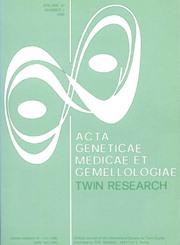Article contents
Utility of Genetic Markers in the Study of Human Resemblance
Published online by Cambridge University Press: 01 August 2014
Abstract
A method for the estimation of genetic correlations based upon analysis of genetic marker phenotypes is presented. At a given marker locus, the probability of observing a pair of individuals with a specific combination of phenotypes can be expressed as a function of the gene frequencies at that locus and the genetic correlation (R) between that pair. The likelihood of obtaining a sample of n such pairs with their phenotypes at m marker loci can be expressed as a product of nm such functions. From the likelihood function, maximum likelihood estimates of R can be obtained, and hypotheses about R may be tested. A sample of Swedish twin families (61 dizygotic twin pairs, 268 husband-wife pairs, and 164 sib pairs) were analyzed by this method using information from 21 markers. It was found that for the twin pairs, R = 0.458, which was significantly different from the R calculated for sib pairs (R = 0.5 58) but not significantly different from the expected 0.5. For the husband-wife pairs, it was found that R = 0.086, which did differ significantly from the expected value of 0, indicating the presence of nonrandom mating in this population.
Keywords
- Type
- Research Article
- Information
- Acta geneticae medicae et gemellologiae: twin research , Volume 29 , Issue 4 , October 1980 , pp. 255 - 262
- Copyright
- Copyright © The International Society for Twin Studies 1980
References
REFERENCES
- 1
- Cited by


